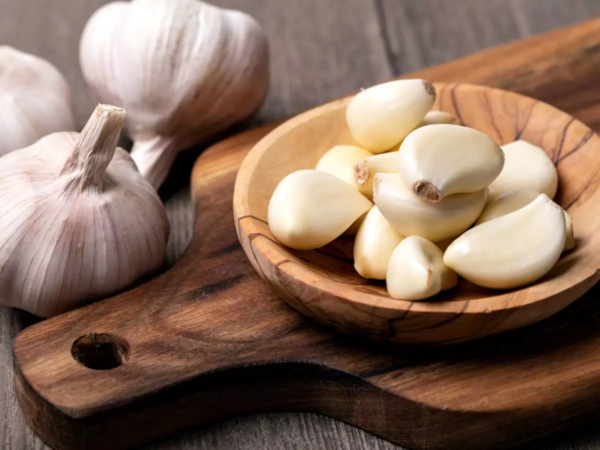Garlic is food often used for its healing properties (known as functional food). Indeed, it helps to fight against cardiovascular diseases and against a lot of inflammation. Furthermore, it is extremely rich in antioxidants that food is both antiviral, antibacterial, antiseptic, antibiotic, and antiparasitic.
Garlic Benefits
1. Garlic against cardiovascular diseases
Garlic has preventive properties against diseases that affect the heart and blood vessels, such as high blood pressure (has a hypotensive effect) or high cholesterol (blood cholesterol levels too high), for example. It has the distinction of being the plant containing the highest amount of sulfur compounds. These are sulfur compounds that are able to fight against the development of cardiovascular diseases related to high levels of cholesterol because they are able to lower its rate and that of triglycerides (that is to say fat ) in the blood.
In parallel, garlic increases the amount of HDL, the good cholesterol, too, prevents cardiovascular diseases. In addition, garlic prevents platelets from aggregating in the blood vessels, which reduces the risk of myocardial infarction and cerebrovascular accident (stroke). To enjoy these benefits, you must consume garlic crushed or cut costs at about 6 grams per day for a month and a half. Similarly, the saponins present in garlic lower the blood cholesterol.
2. A promising treatment against benign prostatic hyperplasia
Korean researchers studied the antiproliferative effects of garlic (Allium sativum) on the progression of benign prostatic hyperplasia, a urological condition that affects most men after 50 years. Currently, for this disease, there is no treatment that is perfect, with no side effects, hence the need to develop herbal treatment.
The researchers evaluated the effectiveness of garlic on benign hyperplasia rat prostate. The garlic administration has limited the growth of prostate tissue and decreased levels of inflammatory proteins. Garlic has allowed the accumulation of protein inducing an apoptosis signal (cell death) and decreased levels of anti-apoptotic proteins such as Bcl-2, Bcl-xL, or survivin. The authors conclude that garlic could suppress the effects of prostatic hyperplasia and represents a potential treatment to develop to treat this disease.
3. A clove of garlic, miles anticancer properties
Soups, pasta, marinated meats, vegetables: garlic adds a palatable supplement to many of our dishes. But garlic is also recognized for centuries for its health benefits. The latest research only confirms these benefits. Thus, several studies indicate a positive effect of eating garlic on the prevention of certain cancers. The results of a meta-analysis and demonstrate a 30% reduction in colorectal cancer risk and about 50% in the risk of stomach cancer cases high consumption of garlic, i.e., about 18 g of garlic per week (six garlic cloves).
4. The anti-infective properties of garlic
Garlic is best known for its anti-infective, antimicrobial, and antiparasitic properties. It allows reducing the risk of falling victim to infection Helicobacter pylori (bacteria responsible for stomach ulcers) or Candida albicans. In addition, the essential oil of garlic is an excellent natural antibiotic. Unlike industrial medicine, garlic only attacks pathogens without eliminating those that are useful. Garlic is also useful against most respiratory infections (bronchitis, pharyngitis, tonsillitis, flu, etc.) or inflammations such as ear infections, canker sores, etc. It can also be used against canker sores or insect bites (in food or poultice). Moreover, it can treat the fungus and, in general, all the parasites and fungi, including the intestine where it eliminates pinworms (towards common in children).
5. It helps fight against viral infections
In a controlled study, researchers recruited 120 adults. 60 received a dietary supplement containing garlic powder and the other received a placebo. After 45 days of supplementation providing 2.56 g per day of garlic, the researchers found a significant increase in the activity of certain cells. After 90 days of supplementation, both groups have caught as many winter viruses but the group that took garlic saw its symptoms decrease by 21% compared to placebo. The impact on the well-being and the ability to work also decreased by over 50%. The researchers conclude that a garlic supplement may be a good way to improve the functioning of the immune system in winter.
6. Garlic is good for the heart
Garlic also has many virtues for heart health. Thus, among the foods with a specific cardioprotective effect, the American Heart Association (AHA) points nuts, soy, legumes, tea … and garlic. Garlic would indeed regulate the levels of total cholesterol, fight against the “bad” cholesterol and lower triglyceride levels – other fats that increase the risk of cardiovascular disease – in the blood. According to scientific studies, this protective effect was observe from a daily consumption equivalent to 2 g to 5 g of raw garlic (1 clove of garlic).
7. Garlic reduces blood pressure
Researchers from the University of Australia highlighted the benefits of aged garlic extract in hypertensive people. According to them, aged garlic would reduce the pressure by decreasing systolic pressure (observed pressure when the heart contracts). In this study, the authors followed 70 patients treated but uncontrolled defined hypertension. Participants received either 4 garlic extract supplements aged a day (equivalent to 2.5 grams of fresh garlic), or placebo for 12 weeks.
Result: the systolic pressure was reduced in people supplemented with aged garlic extract. For scientists, “the extract of aged garlic is considered safe and more tolerable than garlic powder, and higher raw garlic or cooked regarding its antihypertensive properties.”
8. Garlic promotes brain health
According to an American study, garlic helps prevent brain aging and diseases like Alzheimer’s and Parkinson due to a compound called FruArg. The objective of this work was to study the action of aged garlic extract and one of its components (FruArg) on microglial cells. FruArg is part of the family of fructosamine. It is a major component of Aged Garlic extract where it is present at a concentration of 2 to 2.5 mm. Microglia refers to immune cells of the brain and spinal cord that are the primary central nervous system of defense. But increasing the number of microglial cells can have negative effects because these cells produce nitric oxide which in excess, leads to cell damage to the brain and promotes certain neurodegenerative diseases. Here, the researchers recreated environmental stress, causing an increase in microglial cells and their by-products, then they applied FruArg.
Result: FruArg also promotes the production of antioxidants. The garlic extract and FruArg mitigate the neuroinflammatory response and limit the damage of environmental stress on the brain.
9. A superfood
Garlic is not only interesting for its medicinal properties (known as functional food). There is also a superfood containing many useful substances to the body. It is especially rich in antioxidants that protect the body against free radicals involved in the onset of cardiovascular disease, certain cancers (stomach, colon, rectum, and lung cancer), and certain other conditions caused by cellular aging. Those contained in garlic include flavonoids (or polyphenols), vitamin E (tocopherol), and sulfur compounds mentioned above.

The garlic must be consumed in large quantities to provide a large number of nutrients however, it is a good source of bromine, calcium, copper, iron, manganese, phosphorous, selenium, and zinc. Moreover, it contains more or less large quantities of almost all existing vitamins: provitamin A, vitamins B1, B2, B3 (PP), vitamin B5, vitamin B6, vitamin B12, and vitamin C, among others.

